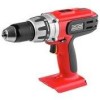Craftsman 26302 Operation Manual - Page 9
Important, Instructions - drill
 |
UPC - 009263020008
View all Craftsman 26302 manuals
Add to My Manuals
Save this manual to your list of manuals |
Page 9 highlights
[] Disconnect ChargerlAdapter from the power supply when not in use. This will reduce the risk of electric shock or damage to the Charger/Adapter if metal items should fall into the opening. It will also help prevent damage to the Charger/Adapter during a power surge. [] Risk of electric shock. Do not touch uninsulated portion of output connector or uninsulated battery terminal. [] Save these instructions. Refer to them frequently and use them to instruct others who may use this tool. If you loan someone this tool, loan them these instructions also to prevent misuse of the product and possible injury. iMPORTANT SAFETY iNSTRUCTiONS [] SAVE THESE INSTRUCTIONS. This manual contains important safety and operating instructions for battery Charger/Adapter 320.25709 and battery pack 320.25708. [] Before using battery Charger/Adapter, read all instructions and cautionary markings on battery Charger/Adapter, battery and product using battery. [] CAUTION. To reduce the risk of injury, charge only lithium-ion rechargeable batteries. Other types of batteries may burst, causing personal injury or damage. _L,WARN|NG: Use of this product can generate dust containing chemicals known to the state of California to cause cancer, birth defects or other reproductive harm. Some examples of these chemicals are: [] Lead from lead-based paints. [] Crystalline silica from bricks and cement and other masonry products. [] Arsenic and chromium, from chemically treated lumber. Your risk from these exposures varies, depending upon how often you do this type of work. To reduce your exposure to these chemicals: [] Work in a well-ventilated area. [] Work with approved safety equipment, such as those dust masks that are specially designed to filter out microscopic particles. Avoid prolonged contact with dust from power sanding, sawing, grinding, drilling and other construction activities. Wear protective clothing and wash exposed areas with soap and water. Allowing dust to get into your mouth, eyes or lay on the skin may promote absorption of harmful chemicals.















